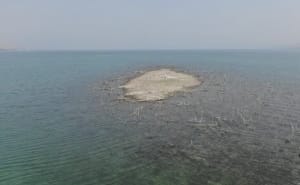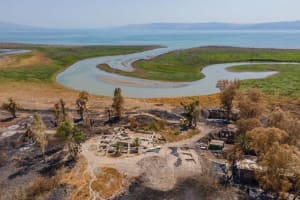Heaviest rainfall in 93 years hits northern Israel

Northern Israel received a record rainfall overnight Wednesday and Thursday morning, with over 100 mm (3.9 inches) of rain in the northern coastal town of Nahariya, which resulted in drainage problems and flooding in the area.
The unprecedented rainfall broke Israel’s previous record of 95.7 mm (3.76 inches), set in Gush Etzion near Jerusalem in September 1932 – 93 years ago. In Haifa, heavy downpours forced the closure of beaches and overwhelmed drainage systems. The heaviest rain was concentrated along the northern coastal plain, the Carmel region, and the Western Galilee, where Nahariya is located.
“This can definitely be defined as the yoreh – the first rain of the season – even if it isn’t felt in every part of the country,” explained Dr. Amir Givati, head of the Israel Meteorological Service. Yoreh is the biblical Hebrew term for the first autumn rainfall.
The meteorologists warned of “extreme rainfall” and called on residents in the affected areas of the country to avoid non-essential travel. Israel’s Meteorological Service emphasized that swimming in the sea was dangerous, with unprecedented waves in the region reaching up to 2 meters (6.56 feet).
While the heavy rainfall was expected to ease in the short term, forecasts predicted hot, dry conditions in southern regions, including the Judean Desert, the Dead Sea, and the northern Arava Valley – areas that typically receive far less rain.
Yuval Sapir, a botanist at Tel Aviv University, told the Times of Israel that heavy rains in September are not unusual, as the month marks the transition from summer to autumn. Asked whether the downpour would affect wildflower blooming, he explained that the rain was too short-lived and intense for the soil to absorb, and most of it was concentrated in northern Israel.
Due to its location between the Mediterranean Sea and surrounding desert areas, Israel experiences infrequent rainfall and often faces long periods of drought. Due to its limited natural water resources, Israel has been compelled to innovate, emerging as a world leader in water technology and desalination.
In May, Israel’s national water company, Mekorot, announced plans to expand the country's desalination capabilities to mitigate the risk of severe drought. Most of Israel’s limited rainfall typically occurs during the short winter months, but last winter was among the driest in years.
Riki Mor, head of Corporate Responsibility at Mekorot, explained at the time, “We have built a unique model that examines the implications of climate change decades into the future. Israel is warming, and we are in an era of extreme climate change, where scenarios may include increased heat and longer heatwaves, droughts and drying seasons, wildfires, storms, flooding, and rising sea levels.”
He warned: “These scenarios have numerous implications for Israel’s water resources, some of which may even impact our ability to supply water, reduce natural water sources, and affect water quality."

The All Israel News Staff is a team of journalists in Israel.
You might also like to read this:

















